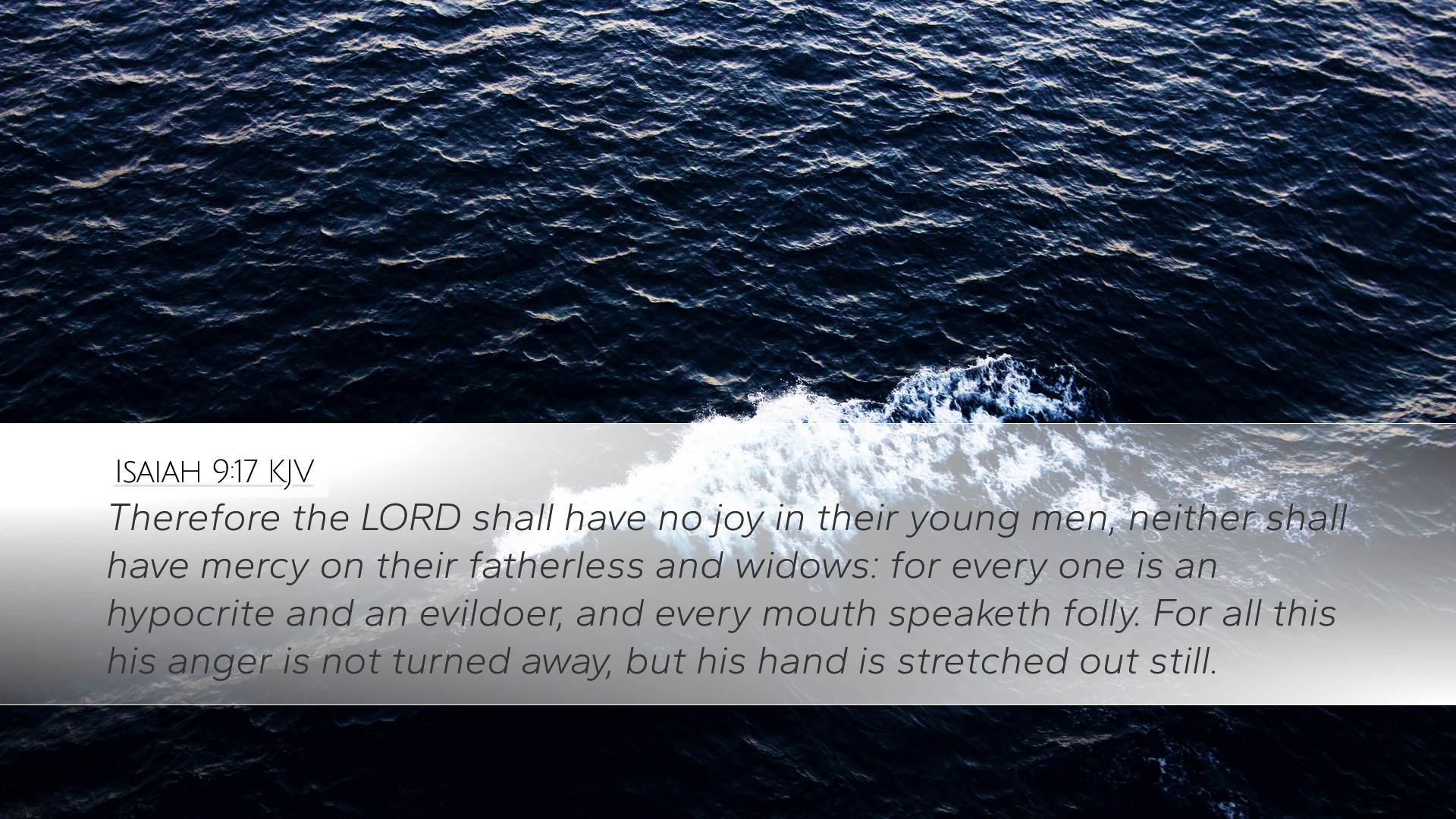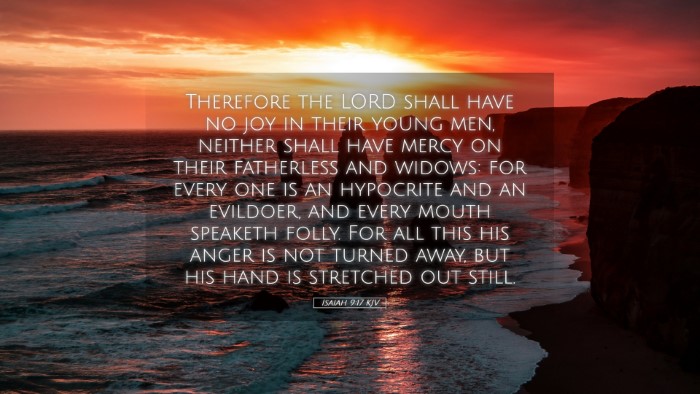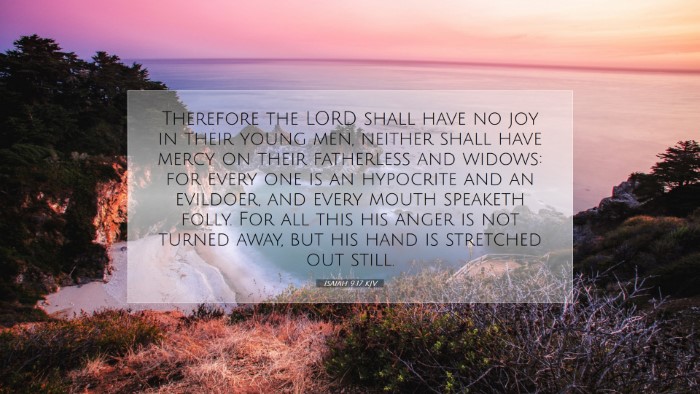Commentary on Isaiah 9:17
Isaiah 9:17 states:
"Therefore the Lord shall have no joy in their young men, neither shall have mercy on their fatherless and widows: for every one is a hypocrite and an evildoer, and every mouth speaketh folly. For all this his anger is not turned away, but his hand is stretched out still."
This verse appears within a broader prophetic context in the Book of Isaiah, emphasizing the moral and spiritual decay of Israel and the consequent judgment from God. In engaging with this passage, we shall draw on insights from public domain commentaries, particularly those by Matthew Henry, Albert Barnes, and Adam Clarke, to unpack its theological implications and practical applications.
Context of Isaiah 9
Isaiah 9 emerges after a series of pronounced judgments laid upon Israel due to its unfaithfulness. The opening verses of this chapter herald a promise of hope—a light for those dwelling in darkness, foreshadowing the coming of the Messiah (Isaiah 9:1-7). However, verse 17 reminds the audience of the sobering reality of divine judgment that accompanies divine mercy.
Insight from Matthew Henry
Matthew Henry emphasizes the seriousness of human moral failure in this verse. He indicates that God's lack of joy in Israel's young men reflects a broader rejection of true righteousness. These young individuals, endowed with potential for leadership and moral integrity, fail in their responsibilities and reflect the corrupt nature of society.
- Hypocrisy and Evil: Henry points out that the term 'hypocrite' signifies a severe indictment of the people, highlighting their failure to live in accordance with God’s covenant. This failure leads to societal decay, where fatherless children and widows, typically symbols of vulnerability, encounter neglect and disregard.
- God’s Anger: Notably, despite the gravity of Israel's sins, God's anger is described as ongoing. His 'stretched-out hand' symbolizes both a prolonged opportunity for repentance and a readiness to judge, illustrating the balance between judgment and mercy that pervades Isaiah's message.
Insight from Albert Barnes
Albert Barnes offers a critical exegetical approach, delving into the nature of God's displeasure highlighted in this verse. He notes:
- The Meaning of 'Joy': Barnes elucidates that God's joy in His people is contingent upon their fidelity to Him. When they veer into hypocrisy and evil, He withdraws His joy, which leads to societal collapse.
- The State of the Vulnerable: Barnes underscores the negligence shown towards the fatherless and widows, an essential concern in biblical ethics. He points out that God's mercy is often channeled through His people, and the failure to care for these individuals reflects a deeper spiritual malaise.
- Continued Anger: He reflects on the persistent nature of God's anger, stressing that it is a call to self-examination and an urgent reminder of the consequences of unconfessed sin.
Insight from Adam Clarke
Adam Clarke's commentary sheds light on the structure and style of the Hebrew text, imparting a deeper appreciation for the literary qualities of Isaiah's prophecy:
- Describing Young Men: Clarke remarks that young men are often seen as the hope of a nation, and God's disfavor towards them points to a national crisis.
- Social Justice and Responsibility: He emphasizes that the neglect of the fatherless and widows is a profound social injustice, directly opposing God's command to care for the marginalized. Clarke stresses that societal righteousness is foundational to divine blessing.
- God’s Unyielding Nature: Clarke interprets 'His hand is stretched out still' as a striking image of God's mercy. Despite human failings, God remains poised to demonstrate compassion, should people turn back to Him.
Theological Themes and Applications
The verse encapsulates several theological themes critical for pastors, students, theologians, and Bible scholars:
- Divine Judgment: The severity of divine judgment serves as a cautionary tale. It underscores the necessity for repentance and moral accountability within all domains of society.
- Importance of Righteousness: Righteousness is not merely an individual pursuit but a communal responsibility. The health and vitality of a nation are intertwined with the moral conduct of its individuals.
- God’s Mercy in Judgment: This passage challenges the reader to reflect on God’s character—juxtaposing His holiness and just anger with His unwavering mercy and readiness to reconcile with humanity.
- Social Responsibility: There lies an explicit charge for believers to advocate for justice, especially concerning the vulnerable in society; true faith is lived out through actions, particularly towards those who cannot fend for themselves.
Conclusion
Isaiah 9:17 serves as a profound reminder of the balance between judgment and mercy, the need for personal and collective righteousness, and the call to care for the marginalized. As believers engage with this scripture, it calls them to self-examination and a recommitment to their responsibilities within the community and nation at large. The rich insights from commentators lie not merely in their theological reflections but invite a transformative response to the issues confronting the Church and society today.


